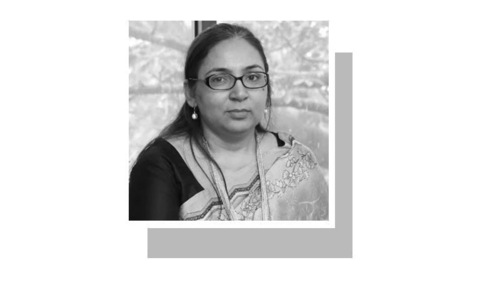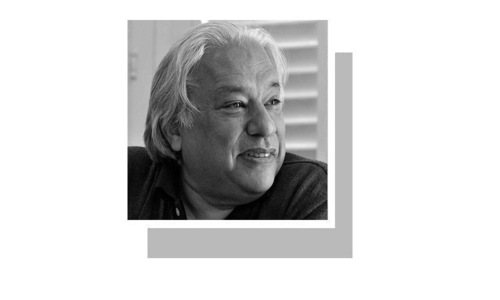Threat or a way out?
INDIAN Prime Minister Atal Behari Vajpayee has taken great umbrage over references to Kashmir made by President Pervez Musharraf in his speech at the UN General Assembly on Wednesday. After inviting India to join in a sustained dialogue to find a solution to the Kashmir issue and offering a jointly observed ceasefire on the LoC, the president had said: “Pakistan would also be prepared to encourage a general cessation of violence within Kashmir, involving reciprocal obligations and restraints on Indian forces and the Kashmir freedom movement.” Mr Vajpayee has described this as a “public admission” that Pakistan is sponsoring terrorism and said India totally refuses “to let terrorism become a tool of blackmail”. In other words, he is suggesting that the implication in Gen Musharraf’s comment is that Pakistan will not stop supporting or promoting “terrorism” in occupied Kashmir until India agrees to a settlement.
Before he so totally flew off the handle, Mr Vajpayee should have considered a couple of points. Many resistance groups based in occupied Kashmir are pro-Pakistan, in the sense that they openly declare their wish to make their territory part of this country. There are groups based in Pakistan that have followers or sympathizers across the border: they too want Kashmir’s merger with Pakistan. Obviously, Pakistan must enjoy some political leverage with these groups. If it is prepared to exercise its influence to persuade them to halt militant activity if India also stops its punitive military operations against Kashmiri activists, is that “terrorist blackmail”? Or is it an offer on the part of Pakistan to cooperate in reducing the level of violence in Kashmir so that an atmosphere conducive to negotiations can be created?
Even if Gen Musharraf’s remarks are interpreted by the Indians as an admission of Pakistani involvement in what Mr Vajpayee calls sponsoring terrorism, that should be seen as Pakistan’s readiness to change such a policy if such a policy has existed or exists at all. In either case, President Musharraf has accepted that a problem of militancy exists, and recognizing a problem should normally be seen as a step towards tackling it. If Pakistan says it is willing to persuade those groups or parties that are prepared to listen to it from carrying out active operations, India should approach the offer in the right spirit and openly declare that if a ceasefire is announced by the militants, it will reduce its armed presence in Kashmir and stop its persecution of the Kashmiris. The point is that as long as India refuses to admit that a majority of the people of Kashmir do not want to be ruled by New Delhi, it will continue to confuse the political aspects of the Kashmir issue with insurgency or “cross-border terrorism”. It has a problem in Kashmir and with the Kashmiri people. This is essentially an indigenous problem and unless it is addressed as such, it will not go away, irrespective of whether anyone is “sponsoring” or not sponsoring “terrorism” or encouraging militant organizations. It is India’s responsibility to win over the Kashmiris, and unless it makes an effort in that direction, it will remain trapped in its blame-Pakistan mindset. Pakistan is trying to show a way out: the opening should be utilized.
Crusading democrat
THE death of Nawabzada Nasrullah Khan snaps a precious link with the political tradition of pre-independence days and the values of decency, tolerance and commitment on which politicians of those days were nurtured. There may have been aberrations in the Nawabzada’s long political career — such as allowing his party to briefly become a part of the Ziaul Haq administration — but these should be judged as errors of judgment rather than a deviation from principles for personal political gain. His conservative background did not induce in him the same active involvement with social issues that he brought to his political work, and he was unable to clearly identify the element of vindictiveness that motivated some of his colleagues in the PNA agitation of 1977. He was also rigid in his attitude to normalization of relations with India. But he was a consistent voice of dissent against the authoritarianism of both civilian and military governments, emerging as the quintessential opposition figure, and his sincerity in working for a democratic Pakistan won the respect of even those whom he publicly opposed. In recent times, he had adopted an uncompromising stand on the LFO and refused totally to accept the new dispensation.
The Nawabzada had crossed swords with both Benazir Bhutto and Nawaz Sharif, but in the wake of the 1988 elections, he had worked assiduously, if unsuccessfully, to persuade the PML and the PPP to work together. He had made greater headway in this direction recently by bringing the two parties within the fold of the Alliance for the Restoration of Democracy (ARD), and the alliance may now well be beset with a crisis of leadership. The Nawabzada had resisted any tendency to do a deal with the government and kept his flock in line by sheer force of his personality. With the Nawabzada gone, the government may make a renewed effort to poach on the ARD. The slender link between the ARD and the MMA may also come under added strain. In a Dawn Dialogue interview published just three weeks ago, the Nawabzada had described the existing situation as worse than dictatorship because all institutions had been undermined, and said: “It’s like painting dictatorship as democracy. If a cock crows at midnight, it doesn’t mean that it’s morning.”
Not the right remedy
THE news that the Karachi Electric Supply Corporation (KESC) is planning to retrench 3,500 employees from its total work force of 15,000 as part of a restructuring process prior to its privatization seems to be a misplaced exercise. For one, it clearly illustrates the jumbled priorities the management has in running this utility. While there is a case to be made for retrenching surplus employees in the corporation who were recruited in the past at the behest of powerful unions or political interests, it has to be understood that this is not the most pressing problem facing the corporation and one that should be solved first.The priority in improving the functioning of the KESC should be targeted at reducing line losses, which have reached unacceptable levels. Line losses stand at 40 per cent, when the internationally accepted level is under 10 per cent. Much of these losses arise from power theft as well as from an old and inefficient distribution network.
There has been little work done in this regard despite the fanfare with which the army took over the utility in 1999. To this day, power breakdowns are frequent, and little has been done to check power thefts and line losses or collect unpaid dues especially from defaulting government agencies and other bulk consumers. Instead of tackling these problems, the KESC has decided to take the easy way out by frequently raising power tariffs and now with a proposal to reduce its employee load. In this regard, the failure to achieve performance targets on all major counts during fiscal 2002-03 should be a focus of attention. While there are plans to sell off such potentially lucrative public sector enterprises as the KESC, any investor would be interested in finding out what efforts are being made to realize defaulted dues and in improving the utility’s transmission and distribution system. That is the crux of the problem on which the management should be concentrating its energies at this stage.










































Dear visitor, the comments section is undergoing an overhaul and will return soon.